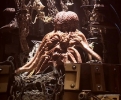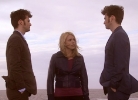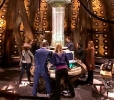Journey’s End
Russell T Davies and I have genuinely different ideas of what means “epic”. It’s taken four years to work it out, but I’m reasonably clear on it now. Russell thinks it’s defined by the scale of what you’re talking about, and I think it’s the scale of what you do.
Davies’ Doctor Who finales have consistently involved people standing around in one, perhaps two rooms, talking about the fate of some massive thing (this year, it’s the universe, but we used to settle for the Earth). Last year, the Doctor actually spent an entire year, and most of the episode, inside the large room in question. I can usually see what they’re shooting for, but frankly, a two-parter like ‘The Empty Child’ seems more epic to me, simply because the action shifts from night club, to Big Ben, to a hospital, to a bomb site, to an abandoned house, etc. By contrast, the lion’s share of ‘Journey’s End’ takes place either in the TARDIS, or in one of two rather similar looking parts of the Dalek mothership.
To an extent though, that’s all incidental. It doesn’t matter if the story’s set in just one tiny closet if it’s otherwise awesome. ‘Journey’s End’ isn’t, though. It’s passable, and it almost makes up for the lack of Doctor this time last year in an unexpected way. But once again, there’s so many things that I just don’t get. And they mar the joy of having this lovely cast dancing about my screen.
The Shadow Proclamation! The Doctor regenerating! Rose returns with mysterious powers of teleporting about! There’s still something on Donna’s back! She’s got a funny heartbeat thing going on! Oh, the massing plot threads of last week. They barely had time to do anything vaguely interesting, they were so busy setting all this stuff up. And then what happens? The Shadow Proclamation completely fail to come to war. Donna is not, in fact, still in a parallel universe. Rose just can zip about, it’s not important, and she hasn’t really got any sort of plan or objective other than “Hello, Doctor.” And those are just the minor disappointments. Let’s talk about the big one.
How, in all that’s holy, is it a thrilling plan to devise a huge cliffhanger, only to resolve it with a cop out? There’s clearly expectations created with a regeneration, exciting expectations, and NOT REGENERATING IS NOT ONE OF THOSE. I don’t get it. Is it a homage to how nothing happened last week? I’m being disingenuous; clearly, it’s designed to get everyone watching the week after, and of course, it looks like it worked. But this is Doctor Who, and it’s not exactly unpopular these days, is it? Do we need these cheap shots? I guess, if anyone knows the answer, it’s more likely to be a successful TV producer and writer than a shlub in Brunswick. But that doesn’t mean I can’t be annoyed.
So, what actually does happen this week? Well, as the Doctor’s companions nip round following their own plans,1 the Doctor himself manages to not die, and instead, to finally do something with that grotty hand he’s been keeping in the TARDIS all this time.2 Whilst the Doctor gets hauled into the Dalek ship — a ship which disappointingly looks rather less impressive on the inside than the ship three years ago — his hand becomes its very own Doctor, and comes back to save the day. Well, comes back to try to save the day.3
In the middle of all this is Davros and Dalek Caan — two shining beacons of crazy evil in a rather plodding plot. Davros is perfectly played by Julian Bleach; the ultimate mad scientist; and even gets to be insightful about the Doctor and his companions. Though the set-up to this moment is perhaps a little contrived, it’s made up for by the fact that Davros is undeniably right, to some extent. Even his ridiculously evil plan doesn’t seem too ridiculous when Julian Bleach says it. Meanwhile, Caan’s giggling insanity is a joy to listen to, and his pivotal role in events makes him perhaps the most interesting character in the story.
But then, he’s probably not, because we’ve got Donna as well. Back when I heard Catherine Tate was returning to the series, I was highly sceptical. And, it turns out, completely wrong. While part of Donna’s appeal might just be the refreshing change of a companion who doesn’t have the hots for the Doctor, Tate has to take a lot of the credit. It’s been clear for many years now that the companion has to be the heart of the series,4 and Donna’s emotional courage has filled that role admirably.
Which makes the final scenes all the more affecting. After muddling through the Doctor and the Doctor and Rose’s rather oddly scripted farewell, we’re treated to an epilogue which is up there with Russell T Davies’ best work on the series. Earlier in the series, I complained about all the crying. So it’s gratifying to take a break from the melodrama and have a stoic, underplayed tragedy play out — no screaming and special effects, just the Doctor quietly and sorrowfully saving his companion in the only way he can.
Do five awesome minutes make up for an otherwise disappointing and disjointed episode? I don’t know, but I have to admit that despite any flaws, ‘Journey’s End’ probably throws enough elements into the mix to make everyone happy, at least for a bit. And at the end of his last full season of Doctor Who, I can see why Davies would want that.
- Okay, I just want a quick moment with the Osterhagen Key. On this one day in the increasingly improbable history of the Earth, it was probably a not-completely-awful plan, in that it was either the Earth or the Universe, and the choice was clear. On any normal day, it’s the biggest single risk to the planet imaginable. ↩
- Seriously. If I cut off my toenails, I don’t keep them in the living room on display. And even if I did, if somehow someone had almost killed me with the bloody things, then I’d move them. ↩
- I watched ‘Not Fade Away’, the last Angel episode, the other day. Doctor B’s plan to charge at Davros without firing his weapon or doing much at all reminds me of Wesley’s piss-poor plan to kill a sorcerer with his pocket knife. When you can feel the writer making a character stupid to advance the plot, it’s off-putting. On a side note, I’m seriously overdue reviewing that episode. ↩
- Which makes the Doctor the head? Or perhaps, wind, fire, water and earth. ↩



Andy
February 11th, 2009 at 10:35 am
While Russell T Davies primary problem is that he generates an interesting premise and then follows it up with a weak conclusion, I don’t think that’s his only problem.
I was watching Doctor Who: Confidential Cutdown for the werewolf episode last night and Russell T Davies was talking about how epic and exciting the end of the episode was. When he described the scene when Rose and the maids are trapped in the cellar and the monk turns into a werewolf in front of them, it did sound exciting and scary, but somehow that vision ended up as a mediocre werewolf transformation and the usual run away from the bad guy down a corridor scene.
I think part of the trouble is that he is unable to fully develop his ideas on screen the way he imagines them.
Tom Charman
February 12th, 2009 at 10:33 pm
I love ‘Tooth and Claw’, though! I thought that bit was awesome! So I’m having trouble engaging with your opinion on this matter. I’d rank that story as one of his quiet little gems, alongside ‘Smith and Jones’ and ‘Gridlock’.
I don’t really see a flaw in execution there. Unless you’re expecting film-like special effects. I can imagine points that are examples of your last paragraph, like large sections of ‘Last of the Time Lords’, but I don’t think ‘Tooth and Claw’ fits. I think his scope and story is neatly contained in that story.